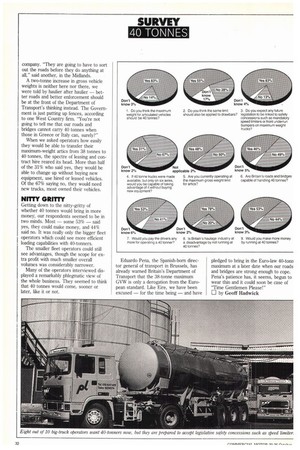ROARING FOR THE FORTIES
Page 20

Page 22

If you've noticed an error in this article please click here to report it so we can fix it.
In our latest survey we asked 250 big-truck operators how they viewed 40-tonne operations in this country — if, indeed, they wanted it at all.
• It is no surprise that our exclusive 40-tonne survey this week shows that more than eight out of 10 British hauliers want heavier trucks on our streets, and want them now. Also, few observers are likely to be surprised to learn that just under eight out of 10 feel they are at a commercial disadvantage being limited to 38 tonnes when the rest of Europe is running at 40 tonnes and above.
What does come as something of a shock is that more than half of the 250 trucking companies we interviewed are ready to pay their drivers more money for running at a two tonnes heavier gross vehicle weight, and that just under half accept that some of our roads and bridges could crumble under the extra burden.
A staggering 49% of respondents reckon that Britain's roads and bridges are incapable of handling 40-tonne GCW trucks. In fact, a good number of those went on to say our roads and bridges are peppered with stretches of carriageway which cannot even handle 38 tonnes, let alone 40.
One haulier from Essex described our road network as "terrible" and a large majority of Scottish operators interviewed felt that the roads north of the border are in worse repair than elsewhere in the country.
SURPRISING RESULT
Perhaps the most surprising result of them all, though, was that well over eight out of 10 operators do not expect to get something for nothing.
Some 83% of the people we interviewed think that an increase to 40 tonnes will be linked through legislation to safety concessions such as mandatory speed limi ters or front underrun bumpers. Several companies told us that they are already working on the basis that anti-lock brakir systems and front underrun bumpers are inevitable.
A couple of hauliers even expect extra weight limits to be linked to legislation oi the type of load hauliers can carry.
A cautious few, however, told us that although more legislation making trucks apparently safer helps appease the environmentalists, new restrictions should only be introduced if it can be proved tha heavier lorries are more prone to accidents than their lighter counterparts.
The whole idea of linking heavier truck to legislative sops is a chronic case of putting the cart before the horse for quit a few of interviewees. "Most of the Continental trucks running over here are overloaded anyway," said one Yorkshire company. "They are going to have to sort out the roads before they do anything at all," said another, in the Midlands.
A two-tonne increase in gross vehicle weights is neither here nor there, we were told by haulier after haulier — better roads and better enforcement should be at the front of the Department of Transport's thinking instead. The Government is just putting up fences, according to one West Country firm. "You're not going to tell me that our roads and bridges cannot carry 40 tonnes when those in Greece or Italy can, surely?"
When we asked operators how easily they would be able to transfer their maximum-weight artics from 38 tonnes to 40 tonnes, the spectre of leasing and contract hire reared its head. More than half of the 31% who said yes, they would be able to change up without buying new equipment, use hired or leased vehicles. Of the 67% saying no, they would need new trucks, most owned their vehicles.
NI'ITY GRITTY
Getting down to the nitty-gritty of whether 40 tonnes would bring in more money, our respondents seemed to be in two minds. Most — some 53% — said yes, they could make money, and 44% said no. It was really only the bigger fleet operators which could see more efficient loading capabilities with 40-tonners.
The smaller fleet operators could still see advantages, though the scope for extra profit with much smaller overall volumes was considerably narrower.
Many of the operators interviewed displayed a remarkably phlegmatic view of the whole business. They seemed to think that 40 tonnes would come, sooner or later, like it or not. Eduardo Pena, the Spanish-born director general of transport in Brussels, has already warned Britain's Department of Transport that the 38-tonne maximum GVW is only a derogation from the European standard. Like Eire, we have been excused — for the time being — and have pledged to bring in the Euro-law 40-tonn maximum at a later date when our roads and bridges are strong enough to cope. Pena's patience has, it seems, begun to wear thin and it could soon be case of "Time Gentlemen Please!"
0 by Geoff Hadwick






























































